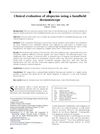Diagnostic Value of Dermoscopic Findings of Hair and Scalp in Cicatricial Alopecia
January 2018
in “
Journal of clinical and investigative dermatology
”

TLDR Dermoscopy is a useful, low-cost method for diagnosing various types of hair loss disorders known as Cicatricial Alopecia.
In 2018, a study was conducted on 30 patients with Cicatricial Alopecias, a group of uncommon hair loss disorders, to evaluate the diagnostic value of dermoscopy. The study found that dermoscopy was a practical and useful tool for diagnosing different types of Cicatricial Alopecia, with a sensitivity of 86.7%. Specific dermoscopic features were identified for different types of alopecia, such as pseudopelade of Brocq and folliculitis decalvans. The study concluded that a polarized-light handheld dermoscope attached to a digital camera is a practical, low-cost, and less invasive tool for diagnosing Cicatricial Alopecia compared to histopathology. However, the study recommended further research with a larger number of patients and different stages of disease activity.






